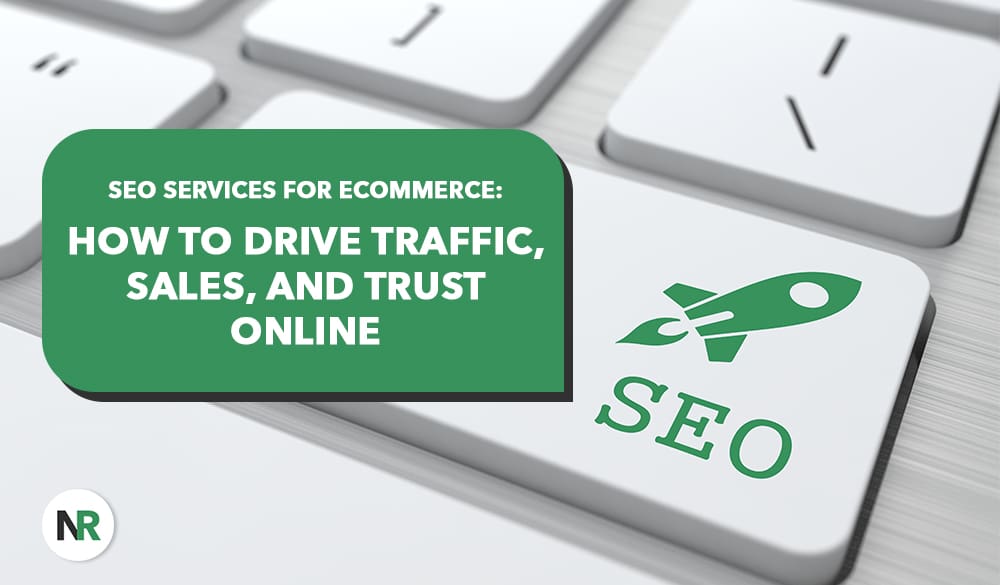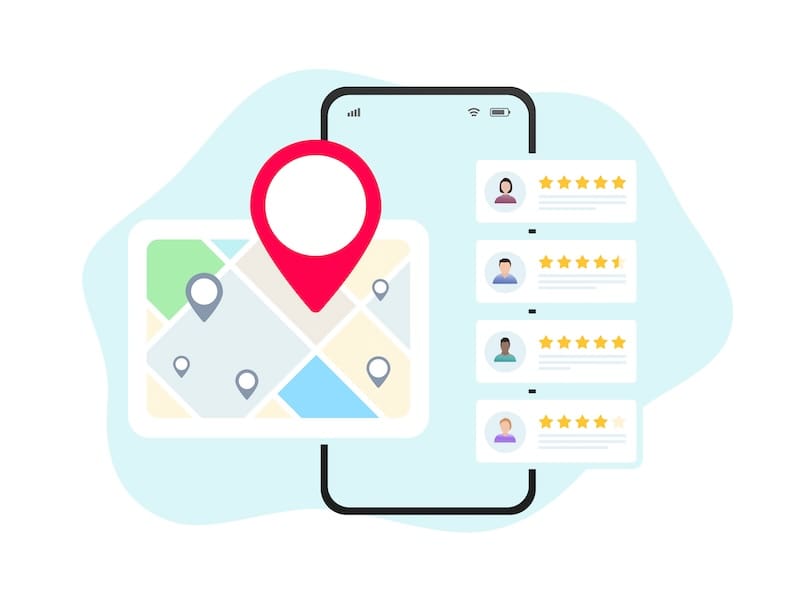This article will explain why SEO services for ecommerce should be a priority for retail businesses.
Ecommerce businesses face unique challenges when it comes to search engine optimization (SEO). With an inventory that’s constantly changing, hundreds or even thousands of product pages, and the chance for duplicate content, it can be difficult to manage a content strategy.
Add to that the need for high performance in terms of site speed and mobile accessibility, and creating a well-performing site with prominent search visibility becomes even more difficult. Moreover, competition means that multiple brands target the same keywords, requiring an even more strategic approach.
It’s also important to note that brand visibility and online reputation affect one another. A brand that ranks well in search results will be more trustworthy to customers; a brand that customers can trust has a better chance of performing well in search.
By neglecting your SEO, you can lose your footing on the search engine results page (SERP) and lose customers to the competition. Luckily, with the right SEO strategy, you can improve your online credibility along with website traffic, conversions and sales.
NetReputation provides information and services to help you protect your digital presence and get more organic traffic. Call us at 844-461-3632 to learn more, or fill out the contact form below for a free consultation.
Request a Free Consultation
An Overview of Professional Ecommerce SEO Services
Ecommerce SEO refers to the process of optimizing the website for an online store to improve the rankings of category and product pages. The higher those pages rank in search engines, the more traffic and sales are likely.
Ecommerce SEO experts focus on content as well as technical improvements, including:
- Building internal links
- Enhancing page speed
- Improving website structure
- Optimizing images
- Using structured data
- Writing unique product descriptions
These SEO efforts have some overlap with general search engine optimization, but there are key differences.
General SEO Services vs. Ecommerce SEO Services
Both regular SEO and ecommerce SEO share the goal of improving a website’s visibility on Google and other search engines. However, how each SEO strategy executes this is different.
For general search engine optimization, which is typically applied to smaller sites, the following types of strategies are used:
- Backlink building
- Content creation
- Keyword optimization
- Site authority improvements
This type of SEO strategy applies to blogs, corporate websites and service providers. This is in contrast to ecommerce SEO, which is used on large, complex sites with hundreds or thousands of category and product pages.
An ecommerce SEO strategy will often include the following:
- Collecting customer reviews
- Managing duplicate content
- Improving site architecture for better navigation
- Optimizing mobile performance
- Setting up secure checkout pages
- Using product schema markup
This type of SEO strategy serves to attract new customers and make sales while improving search engine visibility and consumer trust. Whereas basic SEO services focus on improving search engine rankings, ecommerce SEO takes that a step further to optimize site usability and conversions.
Why Is Ecommerce SEO Important?
The ecommerce space is highly competitive, and retailers who want to stand out and attract customers can’t neglect online visibility.
Chances are, there are other online shops that sell the same products you do, or at least ones that are very similar. If you don’t rise to the top of search engine rankings and give potential customers a reason to choose you over another brand, you’ll miss out on sales.
When a buyer is using search engines to find the types of products you sell, you need your brand to show up in front of them. Ecommerce SEO services create pages that are discoverable, relevant and trustworthy, which is what’s needed to capture high-intent traffic from potential customers.
Additionally, by appearing at the top of search engine results, you’ll communicate that your brand is authoritative and reliable. This has a major impact on purchasing decisions, as customers want to buy from brands that are credible.
Learn about our SEO services here or call us at 844-461-3632 for more information.
4 Reasons To Prioritize an Ecommerce SEO Strategy
If you’re going to compete in the online retail space, you’ll need much more than a website. Here are four key reasons to use ecommerce SEO services.
1. Organic Traffic vs. Paid Advertising
Paid advertising may drive traffic to your site, but once your budget runs out, this strategy stops working. On the other hand, a tailored SEO strategy can drive long-term traffic and offer a higher return on investment (ROI) in the long run. Plus, it can bring in a steadier stream of shoppers and loyal customers than paid ads can.
2. Ranking for Branded and Product Keywords
By optimizing for branded keywords and high-intent product keywords, your site will appear in search results when customers are ready to buy what you sell. A dual-focused content strategy can bring in customers whether they’re searching specifically for your brand or looking for the types of products you offer.
3. Improving Brand Authority and Trust
When you attain higher rankings in the SERPs, you’ll present your brand as being credible. Shoppers trust links that appear high in search results, making them more likely to trust your business. This boost in confidence can be what they need to move forward with a purchase.
4. Prevent Reputation Damage
According to over 95% of responders, a good reputation is the top factor that increases trust in a company. Your ecommerce SEO campaign can prevent negative content from ruining your digital reputation.
By creating positive, high-quality content, you can have it push down negative results, such as competitor mudslinging, misleading information or poor reviews. Your content marketing strategy can put you in control of what people see first about you, which protects your brand reputation and keeps your messaging on target.
What Are the Core Ecommerce SEO Services I Need?
When it comes to your ecommerce business, there are a few types of professional SEO services needed: content, reputation-focused, and technical. By combining these three types of strategies, you can make the biggest impact in your niche.
Let’s go over seven of the most important ecommerce SEO services for your online business.
1. Content Marketing
One of the best ways to attract visitors and convert them into customers is with high-quality content. Your content strategy may include:
- Blog posts
- Customer reviews
- Buying guides
- FAQs
- Product videos
- Q&A sessions
- Tutorials
Content can be repurposed and used for different platforms, too. For example, you can write blog posts for your website and then turn them into video tutorials for YouTube.
2. Digital PR and Link-Building
To help your brand and products rank higher online, digital PR strategies are useful, such as:
- Authoritative backlinks
- High-authority partnerships
- Influencer mentions
This type of positive coverage from respected sources can also counteract negative content and improve your digital reputation.
3. Keyword Research
It’s nearly impossible to reach potential shoppers if you’re not optimizing for the correct keywords. Having a keyword strategy means optimizing for the buyer’s intent, using long-tail terms that are more targeted than general keywords, and utilizing seasonal or trending searches to appeal to what customers are interested in now.
4. Local SEO
If your ecommerce business is specifically for a geo-based audience, you’ll want to add local SEO to your overall SEO campaign. In addition to making your website discoverable, you also want to improve the organic visibility of your brick-and-mortar locations. Optimizing your Google Business Profile and targeting local keywords will help attract shoppers in your area.
5. On-Page Optimization
To improve search rankings as well as the user experience, you need on-page ecommerce SEO, such as:
- Adding alt text and metadata
- Guiding shoppers via internal linking
- Optimizing category and product pages
- Using structured data for rich snippets
- Writing compelling product descriptions
When search engines as well as customers can find and understand the content on your website, they’ll have an easier time navigating it. Without a user-friendly site, it’s difficult to turn visitors into customers — or to get them to hang around at all.
6. Reputation Management
Reputation management and SEO services go hand-in-hand when it comes to building and maintaining brand trust. Strategies like monitoring branded search results, addressing negative feedback and pushing positive content higher on the SERP protect your brand reputation while driving business growth.
Up to 90% of online shoppers won’t buy from a brand with a poor reputation, and customers will even pay more for the same item from a company they’re unfamiliar with rather than one that’s had a recent scandal.
At NetReputation, we work with businesses to create a positive user experience in an effort to drive traffic and sales. Give us a call at 844-461-3632 to learn more.
7. Technical SEO
Your site can’t just look great and be optimized with relevant keywords — it has to perform well, too. Technical SEO includes:
- Improving website speed
- Optimizes for mobile-first indexing
- Structures product pages
Elements like site structure, mobile optimization and website speed are necessary to keep Google and your target audience happy.
Common Ecommerce SEO Challenges
Compared to a regular, non-commerce website, an ecommerce website will face unique challenges. Here are four SEO considerations for your ecommerce store.
1. Duplicate Content
When you have the same product in multiple variations, like different colors and sizes, it’s easy to generate duplicate (or almost-duplicate) content. While this sounds like it keeps product descriptions streamlined for your audience, it’s not search engine-friendly, as it can confuse them regarding rankings.
When multiple pages have the same or similar content, Google doesn’t know which one to rank above the others. This can dilute the SEO value of all of the similar pages and reduce organic traffic.
By using canonical tags, noindex tags and unique product descriptions on every page, you can solve this problem.
2. High Competition
The big marketplaces — like Amazon and eBay — tend to dominate the e-commerce world, making it difficult for a smaller ecommerce store to be noticed. In order to compete, you’ll need to use both tried-and-true strategies and the latest SEO trends available to you. This includes backlink building, content creation, niche keyword research, and on-page SEO.
3. Inventory Management
When it comes to running an online store, inventory management is an ongoing process. And as products are discontinued or go out of stock, 404 errors, broken links and thin content (which provides no value to users) can occur. When these pages are left undealt with, rankings can suffer, and visitors will become annoyed at not finding what they’re after.
Strategies to solve this issue include redirecting pages to similar products, using stock notifications for limited-edition items, and updating pages as needed to meet SEO goals.
4. Problematic Product Descriptions
With so many product and category pages to juggle, it’s common for an ecommerce website to default to manufacturer descriptions of items. Unfortunately, this leads to duplicate and thin content that won’t compete well online.
Instead, it’s best to approach every category and product page as though it’s important. Use competitive keywords, unique meta descriptions and other must-have ecommerce SEO tactics across your entire ecommerce website.
Hiring an Ecommerce SEO Agency
Investing in professional SEO services from an ecommerce SEO agency can make a huge difference in organic traffic, online sales and your digital reputation. While it’s possible to manage ecommerce SEO services with an in-house team, it may be in your best interest to leave complex tasks to an experienced SEO company.
Here’s what to consider when hiring an ecommerce SEO agency:
Ecommerce Platform Experience
It’s important to choose an SEO company with experience on the ecommerce platform you use or might use in the future. These include BigCommerce, Shopify and WooCommerce. In order to effectively carry out on-page optimization, technical SEO and more, your ecommerce SEO agency needs to be familiar with your platform of choice.
Customized E-Commerce SEO Strategies
Your online store isn’t like anyone else’s, and a one-size-fits-all approach won’t cut it. Look for an SEO agency that will take the time to learn about your specific goals, needs and target audience. The strategy they use should be tailored specifically for your ecommerce store.
Proven Track Record
Read reviews and ask to see case studies of clients the ecommerce SEO agency has worked with. Assessing metrics, such as conversion rates, organic traffic and search rankings, will provide valuable insights into what it’s like to work with the company.
Transparent Reporting
Ask about how the SEO agency reports on their progress. You should get regular updates about key performance metrics, such as conversions, keyword rankings and traffic. This is the only way to determine if you’re getting value out of the SEO agency, and no reputable company will gatekeep this information.
Reputation Management Services
Since ecommerce SEO and online reputation are so closely linked, it’s helpful if the SEO agency you hire also has ORM experience. A reliable SEO agency will monitor brand-related search results, mitigate negative feedback and promote quality content in addition to its regular ecommerce SEO tasks.
Consider this: Almost 62% of online shoppers search for a company online if they’re not familiar with it. Very few of them will make a purchase if negative reviews show up on the search results page.
Looking for an SEO Agency? Contact Us Today
At NetReputation, we provide a broad range of SEO services to local and ecommerce businesses that need to drive growth. Additionally, we offer online reputation management services, such as content removal, review management, and more.
It’s time to take control of how people perceive your brand online so you can attract the opportunities you deserve.
Call us at 844-461-3632 or fill out the contact form below to speak with an expert.
Request a Free Consultation










